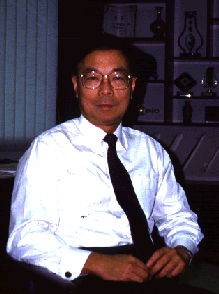





 The choice of Professor Cheng
The choice of Professor Cheng
Selection process for the head of Hong Kong University under fire By Ada Sin
P rofessor Cheng Yiu Chung, the vice-chancellor of the City University of Hong Kong, will leave for the University of Hong Kong in April next year. The event has become the focus of students in both universities. The appointment was made by the selection committee of the University of Hong Kong on 10 July. It stated that Professor Cheng would succeed Professor Wang Gungwu as the vice-chancellor of the University of Hong Kong. Professor Wang leaves his post next month. Originally, the person selected for the post was Professor Woo Shien-bau. However, this choice was later replaced by Professor Cheng without any explanation from the selection group. Miss Rosa Mok Pui Han, president of the Students’ Union of Hong Kong University, said they were not informed about why Professor Cheng was chosen as the new vice-chancellor. She suggested, “I guess it is a rather rash decision. After Professor Woo’s nomination was cancelled, the selection committee had to fill Professor Wang’s vacancy as soon as possible. As the panel knows Professor Cheng well , the evaluation time spent on him was shorter. “Besides, his experiences in academic circles, his achievements as the former dean of the Faculty of Engineering in the University of Hong Kong and his extensive social links were appreciated by the selection committee.” The first complaint about the selection was brought by the union. Miss Mok claimed that the whole selection process was done in camera — that is, behind closed doors. She said, “It is very important that students should have a clear idea about the choice of candidates for vice-chancellor, particularly when 1997 is approaching. “However, students are deprived of the right to know. Access to information is blocked.” Miss Mok gave an example of the dark side of the selection process. “While I was sitting in the selection committee meetings,” said Miss Mok, “a member told me some ‘veiled’ information and urged me to bring it out in the meetings. It was about some unethical deals in the election process. “Afterwards, I discovered that it was merely an trick played by that member so as to manipulate students’ influence in the meetings for his own benefit.” On the other side, President of the Students’ Union of City University Steven Chu Siu Sun stated that the union did not regard their vice-chancellor’s departure for Hong Kong University as an appropriate move. According to Mr. Chu, the selection panel did not consider the well-being of students of City University. He said, “Professor Cheng has initiated various reforms here. His leave for the Hong Kong University may result in the lack of suitable care for this ‘sprouting seed’. “Therefore, the spirit of the staff may be weakened, which will adversely affect the quality of teaching, and so the students.” In fact, Professor Cheng himself does not know why he was selected. The reasons he accepted the position, however, are rather personal. “I am a graduate of the University of Hong Kong, and I once worked at the university for a few years. I feel that I have a close tie with it,” said he. To Professor Cheng, working at the University of Hong Kong is very different from working at City University. Said he: “In the University of Hong Kong, most things have been well-established. They have become traditions that cannot be easily changed. As a result, many constraints are encountered in putting forward reforms. “On the contrary, the City University is just taking off and at the infant stage. Thus, there is more room for development and expansion,” said Professor Cheng. About his previous performance at City University, Professor Cheng believed that there were achievements as well as disappointment. “In these six years,” said Professor Cheng, “the institution has been upgraded from a polytechnic to a university. The number of students has expanded from 3,000 or 4,000 to 20,000.” He continued, “In addition, the administrative structure has been transformed to meet the standards of a university. “However, I regret that it is still far from sucessful in attaining an all-round education and a higher level of language standard.” Meanwhile, the Students’ Union of the University of Hong Kong listed some duties they expect the new vice-chancellor to fulfil. Miss Mok of the union said, “I hope that he will lead our university smoothly through 1997. He should prevent any political intervention in the intellectual freedom or students’ activities by the Chinese government. “Besides, more consultations and discussions with students are needed. We hope that he will explain to us about his policy in the open.” Meanwhile, more communication with the students was an item in Professor Cheng’s plans for the University of Hong Kong. He said, “I will interact with students and the staff more frequently in order to understand them and the policies, especially at the beginning.
“My job also includes the realization of the public expectations towards the University of Hong Kong. Although the progress of the
university has slowed down in recent years, it is still the best one in the mind of the public. Moreover, I hope the university will
become internationally well-known.”
|

